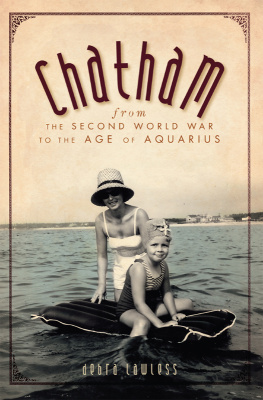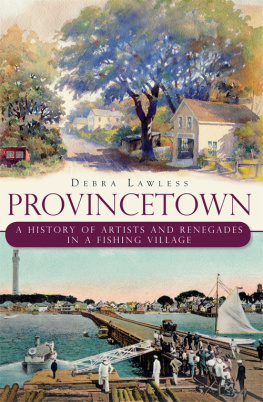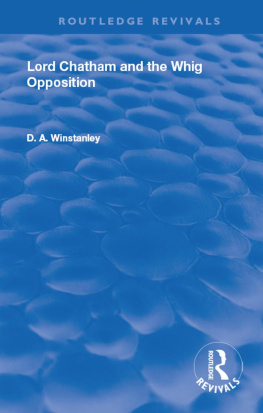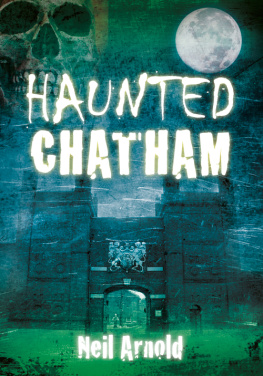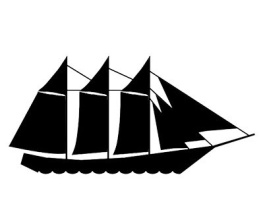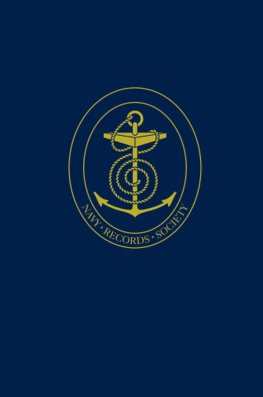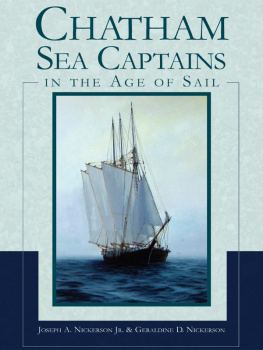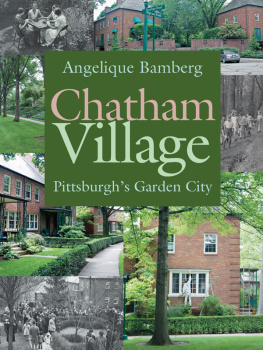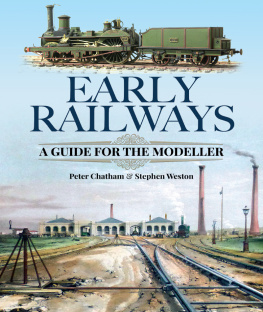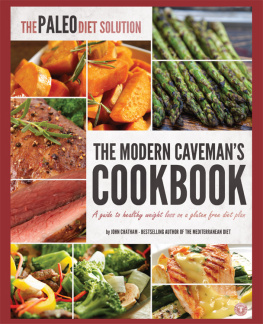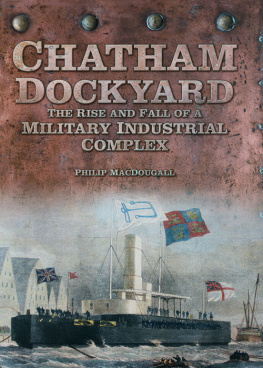PRAISE FOR DEBRA LAWLESSS CHATHAM IN THE JAZZ AGE
Everyone knows that Chatham enjoys some of the most spectacular scenery of any East Coast resort. What we may not know is that great resorts are not just discovered, they are made. In this charming book Debra Lawless chronicles how Joseph Lincoln, Alice Stallknecht and others used their talents to create and sell the idea of Chatham and Olde Cape Cod to the world as it dashed madly into the fun and frivolity of the new Jazz Age.
William Sargent, author of numerous books on Cape Cods coastal environment, including Just Seconds from the Ocean: Coastal Living in the Wake of Katrina, 2008
I have just finished Chatham in the Jazz Age. I liked this book a great deal. As a native Chatham man with Eldridge/Nickerson bloodlines, I know a bit about Chatham and its history. Debras neat little book opened my eyes to facets of Chatham that I knew little about. She writes well and in a manner that makes the reader want more. Great pictures as well.
Dana Eldridge, a thirteenth-generation Cape Codder and the author of three memoirs, including A Cape Cod Kinship, 2008

Published by The History Press
Charleston, SC 29403
www.historypress.net
Copyright 2010 by Debra Lawless
All rights reserved
Front cover: photo by Leroy Aaronson.
First published 2010
e-book edition 2011
ISBN 978.1.61423.158.5
Library of Congress Cataloging-in-Publication Data
Lawless, Debra.
Chatham : from the Second World War to the age of Aquarius / Debra Lawless.
p. cm.
Includes bibliographical references.
print edition ISBN 978-1-59629-886-6
1. Chatham (Mass.)--History--20th century. 2. Chatham (Mass.)--Social life and customs--20th century. I. Title.
F74.C43L38 2010
974.492--dc22
2010008784
Notice: The information in this book is true and complete to the best of our knowledge. It is offered without guarantee on the part of the author or The History Press. The author and The History Press disclaim all liability in connection with the use of this book.
All rights reserved. No part of this book may be reproduced or transmitted in any form whatsoever without prior written permission from the publisher except in the case of brief quotations embodied in critical articles and reviews.
For Stuart Stearns
Friend, mentor
Contents
Acknowledgements
I owe a great debt to the many generous people who have helped me try to answer the question: What was life in Chatham, Massachusetts, like between 1939 and 1969?
I thank: Gene Guild for sharing family recollections and photographs; Robert Hardy for detailed background information; Roslyn Coleman for her tour of Ships Light, Dr. Minnie Bucks former house; Alia Zara Aurami for her recollections of Alice Guild and her grandmother Minnie Buck; Reggie Nickerson for his memories of Minnie Buck and Alice Stallknecht; Henry Schalizki for his vivid wartime descriptions of Chatham; Stuart Stearns for his dedicated research into the technology of World War II and radar; Richard Kraycir for information about Station C Chatham; Harry Cutts for his memories of bombings over Monomoy; Ginny Nickerson for her photo of her father and many insights; Jan Woolf Bilhuber and Bill and Nancy Husted Koerner for their detailed recollections of summers working at Hawes House; Lonnie Pickett for photographs and insight into Chathams radar; Fred Byrne for his recollections of the 1960s; Don and Hannah St. Pierre for their memories of the 1960s; Rick Smith for sharing family photographs and anecdotes about Woodstock 1969; Jack and Bess Moye for reminiscing about their lives in Chatham and the development of Riverbay; Judith Llewellyn and Marilyn Brown for their encyclopedic memories of Chatham; Elizabeth Freedman Doherty for her dogged research into the archives of MITs Lincoln Laboratory; archivists at Mitre Corporate Archives; Mary Ann Gray for her ideas and archival aid; Amy Andreasson for her reference help; Eric Linder for many amusing literary conversations and for alerting me to Sylvia Plaths visits to Chatham; Kassie Foss for her original pen-and-ink artwork and friendship; William Camir for his photograph of Monomoy; Caitlin and Joanne Doggart for fun book signings; author Stephanie Schorow for her early encouragement; and friends at the Chatham Historical Society, the Eldredge Public Library and The History Press. I have in many instances relied on reporting I did for the Cape Cod Chronicle, and I thank my many friends there.
On a personal level, I thank my dear friends Kathrine Lovell, a talented artist; Susan Huling; the Deane Folsom families; Sally Wightman; Mary Siqueiros; and the daughters of the late Jack CollinsMargaret Burns and Kathleen Collins. Jacks friendship was a gift that lasted until his death in January 2010. I thank Emma Willards class of 1977pals for life. I thank my father, Leroy Aaronson, and most of all, I thank my wonderful husband, John.
Introduction
Chatham is Our Town, a friend said. He had just read Chatham in the Jazz Age, my book about Chatham from the early part of the twentieth century to the eve of World War II. Our Town is, of course, Thornton Wilders famous 1938 play set in the fictional town of Grovers Corners, New Hampshire.
Our Town begins in May 1901. At that time, Chatham, like Grovers Corners, was defined by a Main Street, a railroad station, a post office, a school and a town hall. Social life revolved around churches of various denominations (three in Chatham, five in Grovers Corners). In both towns, the earliest tombstones date to the late seventeenth century, and both towns were run by a board of selectmen, were mainly Protestant and Republican and had only a sprinkling of professional men. Compared to Chathams 1910 population of 1,564, Grovers Corners, with its population of 2,642, was teeming.
The play centers on the families of two of the professional menDoc Gibbs and Editor Webb, who publishes the twice-weekly newspaper. While telling the story of these families, the play poses larger questions about lifes profound moments: birth, courtship, marriage, motherhood, death and grief.
Chatham painter Alice Stallknecht captures something of this same world in her cycle of three murals, beginning with Christ Preaching to the Multitude in 1931, continuing with The Circle Supper in 1935 and ending with Every Man to His Trade, completed in 1945. In Every Man, we see the life cycle from birth, in an upper left panel, to death, in the lower right. The towns Methodist and Congregational churches flank the tableau. Stallknecht depicts the towns fishing heritage and nods to the all-important tourism industry by depicting a couple standing in front of the Hawes House sign. We see a farmer, a town meeting and ladies running a shop.

Alice Stallknecht depicted the selectmen giving money to a needy resident in her 1945 mural Every Man to His Trade. The three selectmen also bore the moniker overseers of the poor. Photo by the author from a painting at the Chatham, Massachusetts Historical Society.
Perhaps the greatest difference between Grovers Corners and Chatham is that the residents of Grovers Corners did not engage in a marketing campaign to lure visitors to their town. They seemed content on their own.
Viewing Chatham through the lens of Our Town isnt as fanciful as it might seem. Thornton Wilder spent a part of three summers in the 1920s in Chatham with the Townson family at their house, Sur Mer. The Townsons Shore Road house was next door to Joseph Lincolns house, Crosstrees, and one wonders if the path of Lincoln, also a novelist and playwright, ever crossed that of the young Wilder, who would win three Pulitzer prizes.

